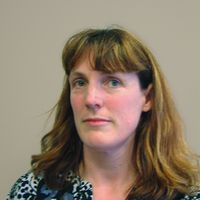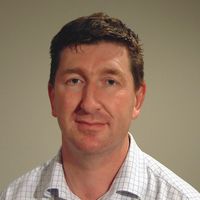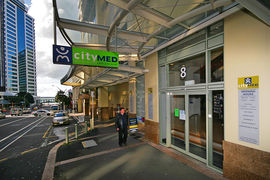Central Auckland > GPs / Accident & Urgent Medical Care > ProCare >
CityMed
General Practice (GP) Service
Today
8:00 AM to 5:30 PM.
Description
CityMed -Your GP's in the CBD- all the healthcare you need!
CityMed is a modern, primary healthcare facility, which offers you a full range of integrated medical services in the heart of Auckland City.
This site will allow you to visit CityMed and check out our facilities, all the services that we provide and the team who provide them.
You can enrol online via our website https://www.citymed.co.nz/enrol to become a funded patient of CityMed (eligibility criteria apply).
Consultations are by appointment only. Our standard consultation time is 15 minutes. Once you have registered and been seen at our practice you will then have the ability to make an appointment and request repeat prescriptions online via our website.
We also offer the services of a Pharmacy, Physiotherapy and Radiology onsite.
Staff
Our team is made up of 11 GPs (see details below under “Doctors" ) and:
Practice Manager: Cerys Lang
Nursing Staff: Kelly (Nurse Manager), Lee-Hon, Mili, Ashleen, Juann, and Linda.
Healthcare Assistants: Tina, Jayde and Luis
Receptionists: Grace (Reception Manager), Ellen, Judy, Lina, Sean, Lucy, Alice, and Lyrique (casual)
Adminstrator/ Accounts: Lee
Doctors
-

Dr Megan Corbett
General Practitioner - Vocationally Registered
-

Dr Robert Kay
General Practitioner - Vocationally Registered
-

Dr Donna Marshall
General Practitioner - Vocationally Registered
-

Dr David McKenzie
General Practitioner - Vocationally Registered
-

Dr Peter Morton
General Practitioner - Vocationally Registered
-

Dr Lidia Nowak
General Practitioner - Vocationally Registered
-

Dr Todd Pritchard
General Practitioner - Vocationally Registered
-

Dr Lisa Searle
General Practitioner - Vocationally Registered
-

Dr Gerald Young
General Practitioner - Vocationally Registered
-

Dr Terry Zhang
General Practitioner
Ages
Child / Tamariki, Youth / Rangatahi, Adult / Pakeke, Older adult / Kaumātua
How do I access this service?
Enrolled patients
Make an appointment
Casual (not enrolled) patients
You are not required to be enrolled with us to access any of our services, however you may have to pay a different fee than what we offer to our enrolled patients.
Contact us
Referral
Website / App
Anyone can access
Enrolling new patients
Fees
Enrolled Patient Fees
| Age Range | Without CSC |
|---|---|
| Under 6 years | $35.00 |
| 6 to 13 years | $35.00 |
| 14 to 17 years | $55.00 |
| 18 to 24 years | $86.00 |
| 25 to 44 years | $86.00 |
| 45 to 64 years | $86.00 |
| 65+ years | $84.00 |
Enrolled Patient Fees (including ACC visits)
| 0-12 years | $35.00 |
| 13-17 years | $55.00 |
| 18- 64 years | $86.00 |
| 65+ years | $84.00 |
Casual Patient Fees (with a Community Services Card)
| 0-5 years | $80.00 |
| 6-17 years | $100.00 |
| 18+ years | $100.00 |
Casual Patient Fees (without a Community Services Card)
| 0-5 years | $85.00 |
| 6-17 years | $105.00 |
| 18+ years | $120.00 |
Casual Patient ACC Fees
| 0-13 years | $85.00 |
| 14-17 years | $100.00 |
| 18 years + | $100.00 |
Non-Resident/ Overseas Visitor Fees
| All ages | $175.00 |
Fees and Charges Categorisation
Fees apply
Hours
8:00 AM to 5:30 PM.
| Mon – Fri | 8:00 AM – 5:30 PM |
|---|
Public Holidays: Closed Waitangi Day (6 Feb), Good Friday (3 Apr), Easter Sunday (5 Apr), Easter Monday (6 Apr), ANZAC Day (observed) (27 Apr), King's Birthday (1 Jun), Matariki (10 Jul), Labour Day (26 Oct), Auckland Anniversary (1 Feb).
Preferred urgent care clinic out of hours: White Cross Ascot - Urgent Care.
Languages Spoken
English, Filipino, Mandarin Chinese, Korean, Spanish
Services Provided
Immunisation is the safest and most effective way to provide protection for you and your tamariki’s health. For more information view the NZ immunisation schedule.
Immunisation is the safest and most effective way to provide protection for you and your tamariki’s health. For more information view the NZ immunisation schedule.
- Pregnancy vaccinations
- Childhood immunisation programme
- 45 year old vaccinations
- 65 year old vaccinations
- Adult flu vaccine
- Child flu vaccine
- Diphtheria / Tetanus / Pertussis (whooping cough) vaccine
- Human Papillomavirus (HPV) vaccine
- Measles / Mumps / Rubella (MMR) vaccine
- Meningococcal vaccine
- Shingles vaccine
- Travel vaccinations
- COVID-19 vaccination and boosters
- Catch-up missed vaccinations
- Respiratory syncytial virus (RSV) vaccine
- Privately funded vaccinations
Immunisation is the safest and most effective way to provide protection for you and your tamariki’s health. For more information view the NZ immunisation schedule.
Your GP's surgery is far more than a place to go when you are feeling unwell and needing a quick cure. The doctor who sees you has gone through an extensive medical training to equip her or him to help children and adults of all ages with a range of physical and emotional difficulties. GPs are at the centre of the healthcare hub and will be aware of services and expertise that are available locally and further-a-field. GPs are also aware of the link that stress and unhappy life events have on physical health so know when to suggest a talking therapy rather than medication.
Your GP's surgery is far more than a place to go when you are feeling unwell and needing a quick cure. The doctor who sees you has gone through an extensive medical training to equip her or him to help children and adults of all ages with a range of physical and emotional difficulties. GPs are at the centre of the healthcare hub and will be aware of services and expertise that are available locally and further-a-field. GPs are also aware of the link that stress and unhappy life events have on physical health so know when to suggest a talking therapy rather than medication.
Your GP's surgery is far more than a place to go when you are feeling unwell and needing a quick cure. The doctor who sees you has gone through an extensive medical training to equip her or him to help children and adults of all ages with a range of physical and emotional difficulties. GPs are at the centre of the healthcare hub and will be aware of services and expertise that are available locally and further-a-field. GPs are also aware of the link that stress and unhappy life events have on physical health so know when to suggest a talking therapy rather than medication.
Health screening tests check for health conditions or early warning signs of disease.
Health screening tests check for health conditions or early warning signs of disease.
- Cervical screening
Health screening tests check for health conditions or early warning signs of disease.
Primary care practices offer a range of services and are able to deal with most minor accident care. If they are not able to deal with an injury they will refer on to the appropriate service.
Primary care practices offer a range of services and are able to deal with most minor accident care. If they are not able to deal with an injury they will refer on to the appropriate service.
Primary care practices offer a range of services and are able to deal with most minor accident care. If they are not able to deal with an injury they will refer on to the appropriate service.
Minor surgery is commonly provided in primary care practices, providing fast, competent removal and biopsies of skin lesions. Other services include cosmetic work such as removal of benign moles and skin tags. Ingrown toenail surgery is also commonly provided. These conditions do not need to be referred to a hospital, perhaps saving you a long wait or a cancelled appointment when a more serious case takes priority. We perform a range of minor surgeries including: * Skin Excisions, cyst excisions, skin grafts and flap repairs, vasectomies, vasectomy reversals, circumcisions (baby 0-6 months), circumcisions (10yrs onwards), hernia repairs (inguinal and umbilical), ingrown toe nails, & dorsal splits.
Minor surgery is commonly provided in primary care practices, providing fast, competent removal and biopsies of skin lesions. Other services include cosmetic work such as removal of benign moles and skin tags. Ingrown toenail surgery is also commonly provided. These conditions do not need to be referred to a hospital, perhaps saving you a long wait or a cancelled appointment when a more serious case takes priority. We perform a range of minor surgeries including: * Skin Excisions, cyst excisions, skin grafts and flap repairs, vasectomies, vasectomy reversals, circumcisions (baby 0-6 months), circumcisions (10yrs onwards), hernia repairs (inguinal and umbilical), ingrown toe nails, & dorsal splits.
Minor surgery is commonly provided in primary care practices, providing fast, competent removal and biopsies of skin lesions. Other services include cosmetic work such as removal of benign moles and skin tags. Ingrown toenail surgery is also commonly provided.
These conditions do not need to be referred to a hospital, perhaps saving you a long wait or a cancelled appointment when a more serious case takes priority.
We perform a range of minor surgeries including:
* Skin Excisions, cyst excisions, skin grafts and flap repairs, vasectomies, vasectomy reversals, circumcisions (baby 0-6 months), circumcisions (10yrs onwards), hernia repairs (inguinal and umbilical), ingrown toe nails, & dorsal splits.
Each GP surgery or primary care practice will have its own procedure for repeat prescribing but the following rules are common to most, if not all. Patients who are well-known to the practice who have a stable condition like asthma, hypertension or diabetes could be allowed to get a repeat prescription for up to six months. Repeat prescriptions are never given to patients who are not known to the practice and there is probably a blanket ban on repeats for narcotics and other drugs that could be misused as doctors are expected to monitor these drugs carefully. We now use ePrescription so no physical prescription is required to be taken to the pharmacy. Prescriptions will now include a bar code which the pharmacy can access online to retrieve your medication details.
Each GP surgery or primary care practice will have its own procedure for repeat prescribing but the following rules are common to most, if not all. Patients who are well-known to the practice who have a stable condition like asthma, hypertension or diabetes could be allowed to get a repeat prescription for up to six months. Repeat prescriptions are never given to patients who are not known to the practice and there is probably a blanket ban on repeats for narcotics and other drugs that could be misused as doctors are expected to monitor these drugs carefully. We now use ePrescription so no physical prescription is required to be taken to the pharmacy. Prescriptions will now include a bar code which the pharmacy can access online to retrieve your medication details.
Each GP surgery or primary care practice will have its own procedure for repeat prescribing but the following rules are common to most, if not all. Patients who are well-known to the practice who have a stable condition like asthma, hypertension or diabetes could be allowed to get a repeat prescription for up to six months. Repeat prescriptions are never given to patients who are not known to the practice and there is probably a blanket ban on repeats for narcotics and other drugs that could be misused as doctors are expected to monitor these drugs carefully.
We now use ePrescription so no physical prescription is required to be taken to the pharmacy. Prescriptions will now include a bar code which the pharmacy can access online to retrieve your medication details.
Sometimes your doctor needs to take a sample of blood or urine either to discover what is wrong with you or to measure something in your blood so that the right medication is given to you. These tests could be anything from blood sugar to a full blood count or a sample of tissue to test for cancer. While urine can generally be tested in the surgery, blood and other specimens are usually sent away for testing at a laboratory. Most results come back within 48 hours unless a very rare test is needed which has to go to a specialist lab further away when it might take a little longer. If you would like a copy of your results emailed to you, please let lab staff know at the time you attend to have your sample taken. The lab will then email you with the results. These of course will still need to be interpreted by your doctor, so phone call from or to your practice may still be required.
Sometimes your doctor needs to take a sample of blood or urine either to discover what is wrong with you or to measure something in your blood so that the right medication is given to you. These tests could be anything from blood sugar to a full blood count or a sample of tissue to test for cancer. While urine can generally be tested in the surgery, blood and other specimens are usually sent away for testing at a laboratory. Most results come back within 48 hours unless a very rare test is needed which has to go to a specialist lab further away when it might take a little longer. If you would like a copy of your results emailed to you, please let lab staff know at the time you attend to have your sample taken. The lab will then email you with the results. These of course will still need to be interpreted by your doctor, so phone call from or to your practice may still be required.
Sometimes your doctor needs to take a sample of blood or urine either to discover what is wrong with you or to measure something in your blood so that the right medication is given to you. These tests could be anything from blood sugar to a full blood count or a sample of tissue to test for cancer.
While urine can generally be tested in the surgery, blood and other specimens are usually sent away for testing at a laboratory. Most results come back within 48 hours unless a very rare test is needed which has to go to a specialist lab further away when it might take a little longer.
If you would like a copy of your results emailed to you, please let lab staff know at the time you attend to have your sample taken. The lab will then email you with the results. These of course will still need to be interpreted by your doctor, so phone call from or to your practice may still be required.
If a man decides he does not want to father children, he may choose to have a vasectomy which is a simple and effective method of sterilisation. During this surgical procedure, the vas deferens (the tubes carrying sperm from the testicles to the penis) are cut. A vasectomy can be carried out in a doctor's surgery and takes between 30 and 60 minutes.
If a man decides he does not want to father children, he may choose to have a vasectomy which is a simple and effective method of sterilisation. During this surgical procedure, the vas deferens (the tubes carrying sperm from the testicles to the penis) are cut. A vasectomy can be carried out in a doctor's surgery and takes between 30 and 60 minutes.
If a man decides he does not want to father children, he may choose to have a vasectomy which is a simple and effective method of sterilisation.
During this surgical procedure, the vas deferens (the tubes carrying sperm from the testicles to the penis) are cut. A vasectomy can be carried out in a doctor's surgery and takes between 30 and 60 minutes.
Liquid nitrogen is a fast, effective treatment provided in many practices to treat viral warts, sun damaged skin, skin tags and many benign cosmetic lesions. It comes in a container with a nozzle and is usually applied by swab or spray. Often one treatment is all that is needed but sometimes it may need repeating after two weeks. Because it cannot be stored for too long, you will often find that your GP will treat a number of patients one after the other. For more information click here.
Liquid nitrogen is a fast, effective treatment provided in many practices to treat viral warts, sun damaged skin, skin tags and many benign cosmetic lesions. It comes in a container with a nozzle and is usually applied by swab or spray. Often one treatment is all that is needed but sometimes it may need repeating after two weeks. Because it cannot be stored for too long, you will often find that your GP will treat a number of patients one after the other. For more information click here.
Liquid nitrogen is a fast, effective treatment provided in many practices to treat viral warts, sun damaged skin, skin tags and many benign cosmetic lesions. It comes in a container with a nozzle and is usually applied by swab or spray. Often one treatment is all that is needed but sometimes it may need repeating after two weeks.
Because it cannot be stored for too long, you will often find that your GP will treat a number of patients one after the other.
For more information click here.
LARC methods are very effective at preventing unplanned pregnancy and are “fit and forget” forms of contraception – you don’t need to remember them every day or every month. LARC methods: Intrauterine Contraceptive Devices (IUCD or IUD) are inserted through the cervix into a woman’s uterus. IUCDs may be either hormonal (Mirena® or Jaydess® ) or non-hormonal (copper IUCD). Jadelle® is a hormone-releasing implant that is inserted just under the skin of the upper arm. Depending on the type of device, it will need to be changed after between three and ten years. Read more about LARC methods here We offer both copper and Mirena IUD's. We are also able to offer Jadelle (long-term implant) contraceptive insertion.
LARC methods are very effective at preventing unplanned pregnancy and are “fit and forget” forms of contraception – you don’t need to remember them every day or every month. LARC methods: Intrauterine Contraceptive Devices (IUCD or IUD) are inserted through the cervix into a woman’s uterus. IUCDs may be either hormonal (Mirena® or Jaydess® ) or non-hormonal (copper IUCD). Jadelle® is a hormone-releasing implant that is inserted just under the skin of the upper arm. Depending on the type of device, it will need to be changed after between three and ten years. Read more about LARC methods here We offer both copper and Mirena IUD's. We are also able to offer Jadelle (long-term implant) contraceptive insertion.
- Implant (Jadelle) inserts
- IUD inserts
- Implant (Jadelle) removal
- IUD removals
LARC methods are very effective at preventing unplanned pregnancy and are “fit and forget” forms of contraception – you don’t need to remember them every day or every month. LARC methods:
- Intrauterine Contraceptive Devices (IUCD or IUD) are inserted through the cervix into a woman’s uterus. IUCDs may be either hormonal (Mirena® or Jaydess® ) or non-hormonal (copper IUCD).
- Jadelle® is a hormone-releasing implant that is inserted just under the skin of the upper arm.
Depending on the type of device, it will need to be changed after between three and ten years.
Read more about LARC methods here
We offer both copper and Mirena IUD's. We are also able to offer Jadelle (long-term implant) contraceptive insertion.
All women and people with a cervix aged 25 – 69 who have ever had intimate skin-to-skin contact or been sexually active should have regular cervical screening. This includes women who have been immunised against HPV. Together, regular screening and HPV immunisation provide the best protection against cervical cancer. There are now more options for how you have cervical screening done: a simple vaginal swab test for HPV, either done yourself or with help from a healthcare professional a cervical sample taken by a healthcare professional (used to be known as a smear test). Talk with your healthcare provider to decide which option is best for you. If HPV is found, you may need to have a follow-up test or be referred directly for colposcopy. If you’ve not yet had HPV testing, you should be screened 3 years after your last test (or 1 year if immune deficient). Once you have had an HPV test, and providing HPV is not found, your next screening will be in 5 years (or 3 years if immune deficient). For more information: Cervical screening | Time to Screen - National Screening Unit
All women and people with a cervix aged 25 – 69 who have ever had intimate skin-to-skin contact or been sexually active should have regular cervical screening. This includes women who have been immunised against HPV. Together, regular screening and HPV immunisation provide the best protection against cervical cancer. There are now more options for how you have cervical screening done: a simple vaginal swab test for HPV, either done yourself or with help from a healthcare professional a cervical sample taken by a healthcare professional (used to be known as a smear test). Talk with your healthcare provider to decide which option is best for you. If HPV is found, you may need to have a follow-up test or be referred directly for colposcopy. If you’ve not yet had HPV testing, you should be screened 3 years after your last test (or 1 year if immune deficient). Once you have had an HPV test, and providing HPV is not found, your next screening will be in 5 years (or 3 years if immune deficient). For more information: Cervical screening | Time to Screen - National Screening Unit
All women and people with a cervix aged 25 – 69 who have ever had intimate skin-to-skin contact or been sexually active should have regular cervical screening. This includes women who have been immunised against HPV. Together, regular screening and HPV immunisation provide the best protection against cervical cancer.
There are now more options for how you have cervical screening done:
- a simple vaginal swab test for HPV, either done yourself or with help from a healthcare professional
- a cervical sample taken by a healthcare professional (used to be known as a smear test).
Talk with your healthcare provider to decide which option is best for you.
If HPV is found, you may need to have a follow-up test or be referred directly for colposcopy.
If you’ve not yet had HPV testing, you should be screened 3 years after your last test (or 1 year if immune deficient). Once you have had an HPV test, and providing HPV is not found, your next screening will be in 5 years (or 3 years if immune deficient).
For more information: Cervical screening | Time to Screen - National Screening Unit
An ECG is a recording of your heart's electrical activity. Electrode patches are attached to your skin to measure the electrical impulses given off by your heart. The result is a trace that can be read by a doctor. It can give information of previous heart attacks or problems with the heart rhythm.
An ECG is a recording of your heart's electrical activity. Electrode patches are attached to your skin to measure the electrical impulses given off by your heart. The result is a trace that can be read by a doctor. It can give information of previous heart attacks or problems with the heart rhythm.
An ECG is a recording of your heart's electrical activity. Electrode patches are attached to your skin to measure the electrical impulses given off by your heart. The result is a trace that can be read by a doctor. It can give information of previous heart attacks or problems with the heart rhythm.
Spirometry is a tool that measures how effectively your lungs are working. It can show how much air lungs are able to hold (their volume) and how much air can be breathed in and out (inhaled and exhaled) which is called flow. It can be used to diagnose problems of breathing and monitor the usefulness of treatment. The test involves taking a deep breath in and blowing out as hard as you can into a hollow tube attached to a spirometer machine. You will be asked to do the test several times. The whole process takes 15 - 30 minutes depending on whether you are given some inhaled medicine and asked to do it again to monitor if there is an improvement. Read more about Spirometry on the Healthify website Peak flow meter This is a small hand-held tube that can measure what is happening in your breathing tubes. You can have one at home and measure your peak flow by blowing into it as hard and fast as possible. You will be shown how to measure it and compare it with what you can blow when you are well as part of your asthma management plan if you think you are having an asthma attack. For more information view on the Healthify website
Spirometry is a tool that measures how effectively your lungs are working. It can show how much air lungs are able to hold (their volume) and how much air can be breathed in and out (inhaled and exhaled) which is called flow. It can be used to diagnose problems of breathing and monitor the usefulness of treatment. The test involves taking a deep breath in and blowing out as hard as you can into a hollow tube attached to a spirometer machine. You will be asked to do the test several times. The whole process takes 15 - 30 minutes depending on whether you are given some inhaled medicine and asked to do it again to monitor if there is an improvement. Read more about Spirometry on the Healthify website Peak flow meter This is a small hand-held tube that can measure what is happening in your breathing tubes. You can have one at home and measure your peak flow by blowing into it as hard and fast as possible. You will be shown how to measure it and compare it with what you can blow when you are well as part of your asthma management plan if you think you are having an asthma attack. For more information view on the Healthify website
Spirometry is a tool that measures how effectively your lungs are working. It can show how much air lungs are able to hold (their volume) and how much air can be breathed in and out (inhaled and exhaled) which is called flow. It can be used to diagnose problems of breathing and monitor the usefulness of treatment. The test involves taking a deep breath in and blowing out as hard as you can into a hollow tube attached to a spirometer machine. You will be asked to do the test several times. The whole process takes 15 - 30 minutes depending on whether you are given some inhaled medicine and asked to do it again to monitor if there is an improvement. Read more about Spirometry on the Healthify website
Peak flow meter This is a small hand-held tube that can measure what is happening in your breathing tubes. You can have one at home and measure your peak flow by blowing into it as hard and fast as possible. You will be shown how to measure it and compare it with what you can blow when you are well as part of your asthma management plan if you think you are having an asthma attack. For more information view on the Healthify website
Another service offered to you at your GP surgery (primary care practice) is advice and immunisation before you go to another country. While you are likely to have the immunisations needed to live in New Zealand, there may be other injections you need to protect yourself before going for example to Africa or South America. In some places you will need protection from rabies or malaria. Yellow fever vaccinations are only available at approved centres; please click here to view the centres in New Zealand. Your doctor will be able to tell you what diseases you will need to be protected from in any named country and advise you on other medical matters. We have two doctors who are Yellow Fever Certified.
Another service offered to you at your GP surgery (primary care practice) is advice and immunisation before you go to another country. While you are likely to have the immunisations needed to live in New Zealand, there may be other injections you need to protect yourself before going for example to Africa or South America. In some places you will need protection from rabies or malaria. Yellow fever vaccinations are only available at approved centres; please click here to view the centres in New Zealand. Your doctor will be able to tell you what diseases you will need to be protected from in any named country and advise you on other medical matters. We have two doctors who are Yellow Fever Certified.
Another service offered to you at your GP surgery (primary care practice) is advice and immunisation before you go to another country. While you are likely to have the immunisations needed to live in New Zealand, there may be other injections you need to protect yourself before going for example to Africa or South America. In some places you will need protection from rabies or malaria. Yellow fever vaccinations are only available at approved centres; please click here to view the centres in New Zealand. Your doctor will be able to tell you what diseases you will need to be protected from in any named country and advise you on other medical matters.
We have two doctors who are Yellow Fever Certified.
All New Zealand children are entitled to 11 free health checks from birth to three years. The checks aim to ensure that children are growing and developing as well as possible. Included in the checks are clinical assessment, health education and family/whanau support. Baby checks are at birth and then at 24 hours, five days and around 2-4 weeks. Babies are weighed and measured to ensure that they are developing correctly. These sessions provide a great opportunity for parents to ask questions from an expert and have any problem addressed; difficulties with breastfeeding or sleep for example. They can also be used to discuss immunisations and vaccinations. These checks will be carried out by your lead maternity carer (LMC). Between the ages of 4-6 weeks and three years, there are seven core health checks available, typically these are around 4-6 weeks, 8-10 weeks, 3-4 months, 5-7 months, 9-12 months, 15-18 months and 2-3 years. These checks may be carried out by a Well Child Provider of your choice e.g. Plunket, Maori health provider, community nurse, a general practice team (doctor and practice nurse). Your LMC will be able to give you a list of Well Child Providers in your area. More information about Well Child services is available on the Ministry of Health website.
All New Zealand children are entitled to 11 free health checks from birth to three years. The checks aim to ensure that children are growing and developing as well as possible. Included in the checks are clinical assessment, health education and family/whanau support. Baby checks are at birth and then at 24 hours, five days and around 2-4 weeks. Babies are weighed and measured to ensure that they are developing correctly. These sessions provide a great opportunity for parents to ask questions from an expert and have any problem addressed; difficulties with breastfeeding or sleep for example. They can also be used to discuss immunisations and vaccinations. These checks will be carried out by your lead maternity carer (LMC). Between the ages of 4-6 weeks and three years, there are seven core health checks available, typically these are around 4-6 weeks, 8-10 weeks, 3-4 months, 5-7 months, 9-12 months, 15-18 months and 2-3 years. These checks may be carried out by a Well Child Provider of your choice e.g. Plunket, Maori health provider, community nurse, a general practice team (doctor and practice nurse). Your LMC will be able to give you a list of Well Child Providers in your area. More information about Well Child services is available on the Ministry of Health website.
All New Zealand children are entitled to 11 free health checks from birth to three years. The checks aim to ensure that children are growing and developing as well as possible. Included in the checks are clinical assessment, health education and family/whānau support.
Baby checks are at birth and then at 24 hours, five days and around 2-4 weeks. Babies are weighed and measured to ensure that they are developing correctly. These sessions provide a great opportunity for parents to ask questions from an expert and have any problem addressed; difficulties with breastfeeding or sleep for example. They can also be used to discuss immunisations and vaccinations. These checks will be carried out by your lead maternity carer (LMC).
Between the ages of 4-6 weeks and three years, there are seven core health checks available, typically these are around 4-6 weeks, 8-10 weeks, 3-4 months, 5-7 months, 9-12 months, 15-18 months and 2-3 years. These checks may be carried out by a Well Child Provider of your choice e.g. Plunket, Māori health provider, community nurse, a general practice team (doctor and practice nurse). Your LMC will be able to give you a list of Well Child Providers in your area.
More information about Well Child services is available on the Ministry of Health website.
Applicants for New Zealand visas may be required to provide medical and chest x-ray certificates to demonstrate an acceptable standard of health. Immigration New Zealand uses eMedical, an online platform for processing immigration health examinations. The examining doctor records the applicant’s health examination results in eMedical then electronically submits them to Immigration New Zealand where they are associated with the applicant’s visa application once it is submitted. Only doctors who have been approved by Immigration NZ are able to conduct the medical examinations. The immigration officer who assesses the applicant’s visa application will determine whether they have an acceptable standard of health. Visa applicants requiring an immigration medical examination must make an appointment with an eMedical enabled clinic on Immigration New Zealand’s approved list. We are a panel clinic for NZ, Australian and US immigration visas.
Applicants for New Zealand visas may be required to provide medical and chest x-ray certificates to demonstrate an acceptable standard of health. Immigration New Zealand uses eMedical, an online platform for processing immigration health examinations. The examining doctor records the applicant’s health examination results in eMedical then electronically submits them to Immigration New Zealand where they are associated with the applicant’s visa application once it is submitted. Only doctors who have been approved by Immigration NZ are able to conduct the medical examinations. The immigration officer who assesses the applicant’s visa application will determine whether they have an acceptable standard of health. Visa applicants requiring an immigration medical examination must make an appointment with an eMedical enabled clinic on Immigration New Zealand’s approved list. We are a panel clinic for NZ, Australian and US immigration visas.
Applicants for New Zealand visas may be required to provide medical and chest x-ray certificates to demonstrate an acceptable standard of health. Immigration New Zealand uses eMedical, an online platform for processing immigration health examinations. The examining doctor records the applicant’s health examination results in eMedical then electronically submits them to Immigration New Zealand where they are associated with the applicant’s visa application once it is submitted. Only doctors who have been approved by Immigration NZ are able to conduct the medical examinations. The immigration officer who assesses the applicant’s visa application will determine whether they have an acceptable standard of health. Visa applicants requiring an immigration medical examination must make an appointment with an eMedical enabled clinic on Immigration New Zealand’s approved list.
We are a panel clinic for NZ, Australian and US immigration visas.
A patient portal is a secure online tool provided by GP practices that can allow convenient access to your health information as well as interaction with the practice e.g. booking appointments and requesting repeat prescriptions.
A patient portal is a secure online tool provided by GP practices that can allow convenient access to your health information as well as interaction with the practice e.g. booking appointments and requesting repeat prescriptions.
A patient portal is a secure online tool provided by GP practices that can allow convenient access to your health information as well as interaction with the practice e.g. booking appointments and requesting repeat prescriptions.
A virtual consultation is a way of having an appointment with your healthcare provider, but not in person. This is usually done via a video app or a phone call. For more detailed information about telehealth consultations, please see the guide from Healthify.
A virtual consultation is a way of having an appointment with your healthcare provider, but not in person. This is usually done via a video app or a phone call. For more detailed information about telehealth consultations, please see the guide from Healthify.
- Telehealth consultations - anyone can access
- Video consultations
- Phone consultations
A virtual consultation is a way of having an appointment with your healthcare provider, but not in person. This is usually done via a video app or a phone call. For more detailed information about telehealth consultations, please see the guide from Healthify.
Sexual and reproductive health services including sexual health screening, information and birth control.
Sexual and reproductive health services including sexual health screening, information and birth control.
- Contraception (birth control) advice
- STD checks (Sexually transmitted disease)
- Menopause
- Male sexual health
- Pregnancy testing
Sexual and reproductive health services including sexual health screening, information and birth control.
This service offers support to people who are overweight or obese to reach and maintain a healthy weight. Weight loss approaches may involve diet and lifestyle changes or weight loss medications, or both may be offered.
This service offers support to people who are overweight or obese to reach and maintain a healthy weight. Weight loss approaches may involve diet and lifestyle changes or weight loss medications, or both may be offered.
This service offers support to people who are overweight or obese to reach and maintain a healthy weight. Weight loss approaches may involve diet and lifestyle changes or weight loss medications, or both may be offered.
Disability Assistance
Wheelchair access
Additional Details
Face to face / Kanohi ki te Kanohi, Phone, Online / virtual / app, Speak with women / wahine, Speak with men / tane, Child / Tamariki friendly, LGBTQIA+ friendly
Online Booking URL
Public Transport
CityMed is located a short walking distance from the Britomart Transport Hub and ferry terminals
Parking
We have two small carparks located at the rear of the practice, however, these are reserved for our surgical patients only. All cars authorised to park here will need to inform reception of their car's registration number. All unauthorised vehicles will be towed.
The closest public parking is at the Downtown Carpark Building - click here for details Downtown Carpark
Website
Contact Details
Quay West Building, 8 Albert Street, Auckland Central, Auckland
Central Auckland
8:00 AM to 5:30 PM.
-
Phone
(09) 377 5525
-
Fax
(09) 379 3793
Healthlink EDI
victormc
Website
Quay West Building
Ground Floor
8 Albert St
Auckland Central, 1010
Street Address
Quay West Building
Ground Floor
8 Albert St
Auckland Central, 1010
Postal Address
Quay West Building
Ground Floor
8 Albert St
Auckland Central, 1010
Would you recommend this service to family & friends?
See ReviewsWas this page helpful?
This page was last updated at 2:03PM on November 18, 2025. This information is reviewed and edited by CityMed.

